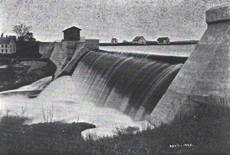
History of Arlington Pond
History
In 1909, the Arlington Mills of Lawrence, Massachusetts began to search for an additional water supply to help drive the generators at the mill during the summer months when water was scarce. They surveyed the Wheeler Mill Privilege located on Old North Salem Road in North Salem. Wheeler Mill was not operational due to a fire. Nearby were fifty residential homes, an electric company, a sanitarium and Wheeler Dam with a ten acre pond that held 19 million gallons of water. Water flowed into the lake from Big Island Pond in Derry, NH and out into the Spicket River, which flowed by the mills. They purchased the properties in 1919 to insure the looms at the mill would be working year round.
In 1920, the work began. The buildings were torn down, hauled away and the trees cut. The timber, one million feet in all, was used for railroad ties at the mill for framing of the dam and for making 900,000 box boards for the mill. By May 3, 1923, the project was complete and the reservoir filled. It held one billion gallons of water and covered 260 acres. Part of the Old North Salem Road is still under water to this day, as well as partial structures of the mill buildings. The dam was 48 feet high with 550 feet of concrete cored dike.
The land surrounding the lake was owned by Thomas Kittredge, Sr. He owned a coffee shop in Haverhill, Massachusetts and sold parcels of the land to his customers; the lots were nicknamed “Coffee Pot Lots”. Problems began when the water was drawn down in the summer and remained a problem until 1974 when the Arlington Pond Protective Association (APPA) was formed to protect and preserve the water quality. The Greater Lawrence Industrial Association owned the dam and the floor of the lake but the town owned the first three feet of surface water. With the intervention of the State of NH and APPA, agreements were made to maintain water levels suitable for summer activities.
The dam and floor of the lake were owned by many over the years. Then in 1980 through an often difficult series of negotiations between Refuse Fuels, Ogden Martin, APPA and the Town of Salem, the rights to “Arlington Pond” were acquired by the Town. Wheeler Dam, as well as the other Dams in town, were in need of repair. At the annual town meeting, money to repair the dams was approved and the three year project of repairing them began. The dam was repaired; the lake was dredged and all debris removed. The State gave approval for refill and the lake was given a Class B status. In 1993, the Town of Salem needed a second source of water supply. Arlington Pond was the most desirable source and APPA negotiated with the town to allow a pipeline to run from the lake to the Water Treatment Plant. The contract includes safeguarding the water levels during the year.
The lake has been transformed many times and each time the water quality is of the outmost concern. The result is a beautiful lake with a high water quality that is not only used for recreation, but as a water supply to the Town of Salem.
By Marie Cammarata, Salem, NH, June 2010



